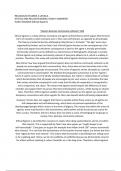Essay
A level religious studies Ethics: Ethical egoism exemplar model essay answer, marked and graded A*
- Institution
- PEARSON (PEARSON)
In depth well written essays on the topic of Ethical Egoism with reference to Many philosophers such as Max Stirner and criticisms include philsophers such as rachels. There is exemplar answers for explaining ethical egoism and the challanges and a 30 marker where you are arguing for and agaisnt. M...
[Show more]




